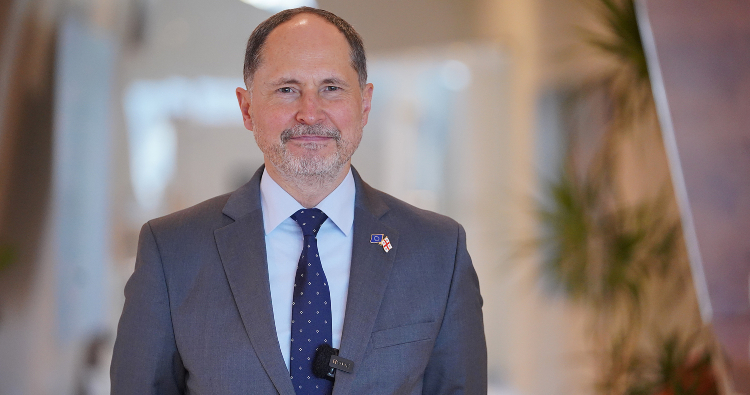EU Ambassador: discussions on Georgia not on agenda of European Council’s Wednesday session

Herczyński noted Georgia was a “free and democratic country” and it was up to its citizens to decide the laws that would be adopted, adding the EU would respect “any decision” made in the country. Photo: Ministry of Economy
Paweł Herczyński, the European Union Ambassador to Georgia, on Wednesday said public protests in Georgia against the controversial domestic bill on transparency of foreign influence were not on the agenda of topics of today’s session of the European Council.
Herczyński’s comments followed a statement by Georgian President Salome Zourabichvili, who on Tuesday addressed Charles Michel, the President of the Council, and Emmanuel Macron, the President of France, to discuss the latest developments in the country at the session.
The diplomat said EU leaders would gather to discuss internal events of the bloc, as well as matters of the Ukraine and relationship with Turkey, noting there was a “possibility” that discussions would cover the ongoing situation in Georgia.
The official also mentioned the position of Michel, who on Tuesday said the adoption of the law would take Georgia “further away from the EU and not [bring it] closer”, and called the legislative piece an “obstacle” which was not in compliance with the norms and values of the bloc.
Herczyński noted Georgia was a “free and democratic country” and it was up to its citizens to decide the laws that would be adopted, adding the EU would respect “any decision” made in the country.
He was also cited by the Georgian Public Broadcaster as saying it was “up to Georgians to decide what future they want for the country”, and noted his role was to present the importance of EU membership and its benefits for the citizens, while also reporting on results of “various decisions” made in the country. The diplomat added the latter should be made by Georgian nationals in the country “and not with the participation of foreigners”.
The domestic protests come against the legislative initiative which calls for registration of non-commercial legal entities and media outlets in the country as “pursuing the interests of a foreign power” if they derive more than 20 percent of their funding from abroad.
It has been reintroduced by the ruling party after its original version was retracted last year following public protests, has been met by criticism from the domestic opposition, non-governmental sector and some of Georgia’s foreign partner governments and diplomatic representations in the country.
 Tweet
Tweet  Share
Share